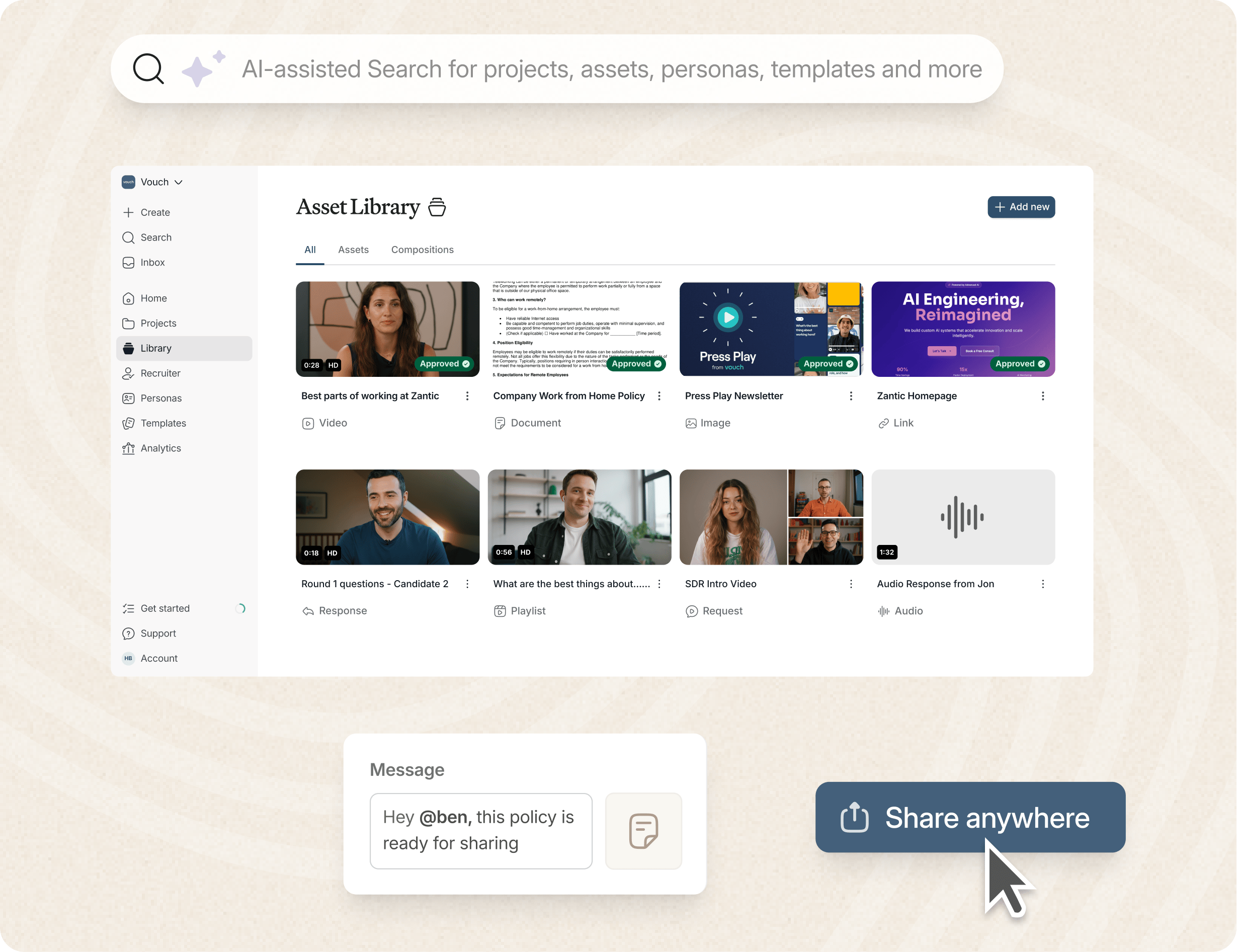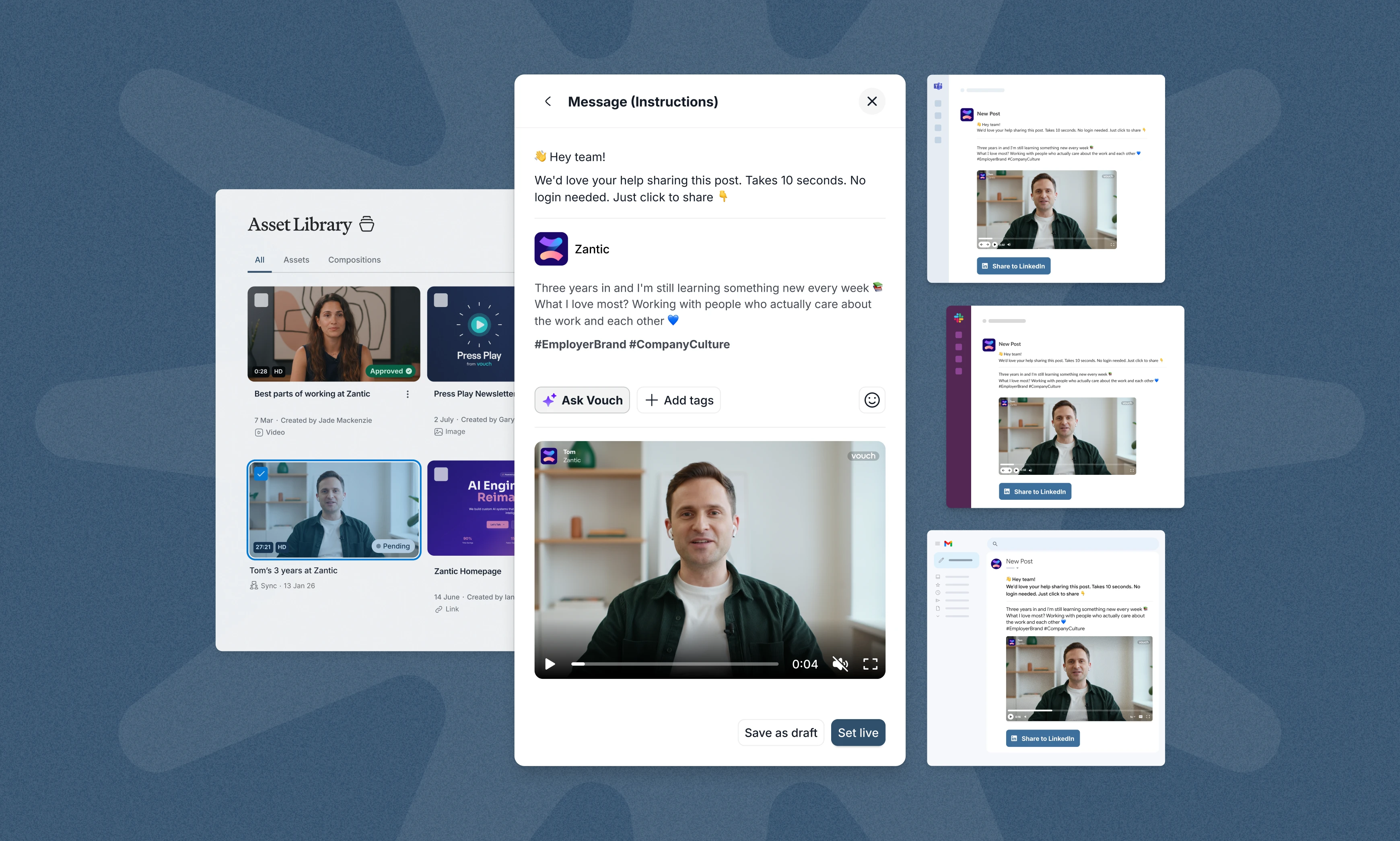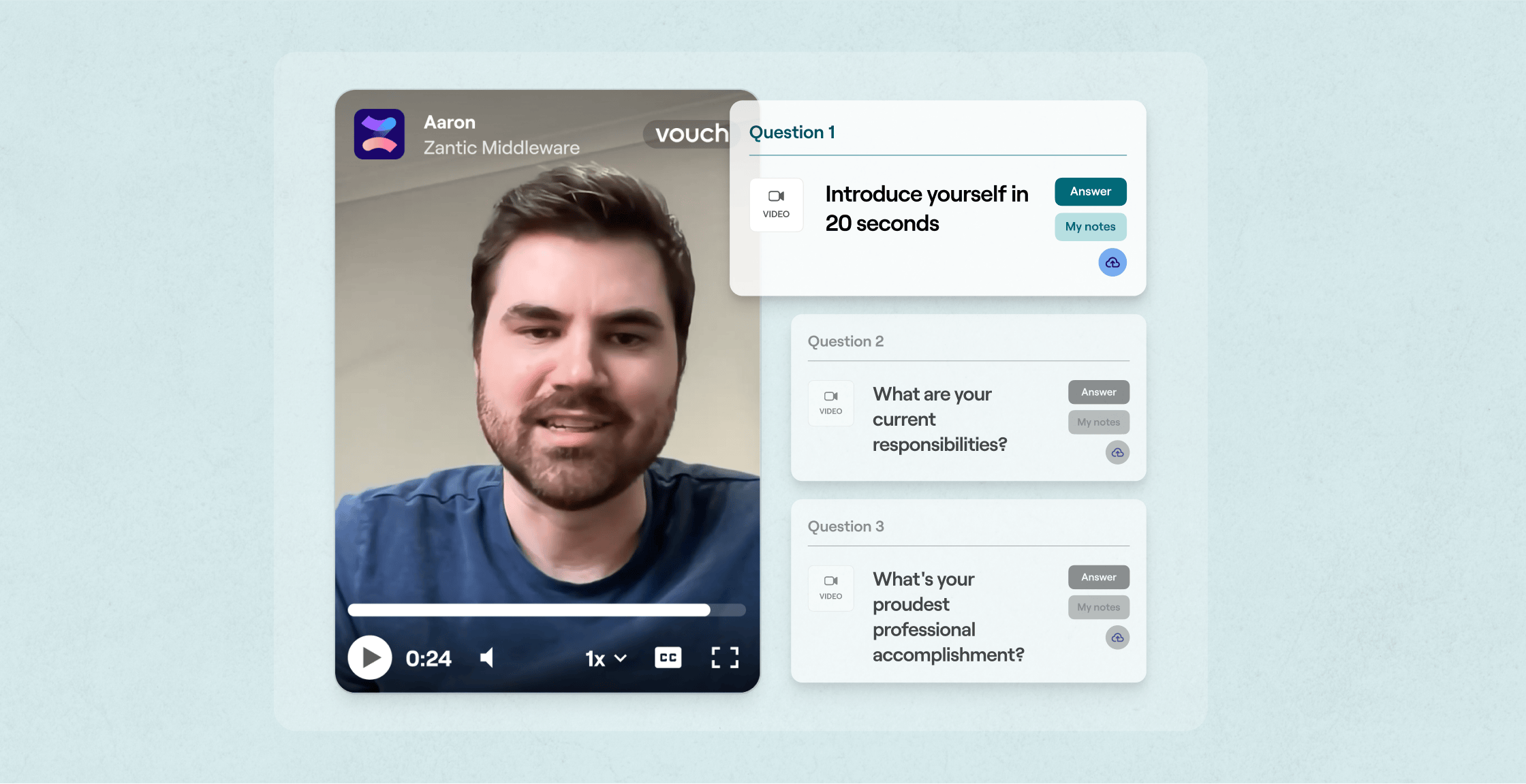Have you ever wondered what a hiring manager does, looking to employ one, or maybe even looking to transition into the field?
Along with critical recruitment and talent acquisition roles, hiring managers play a pivotal role in shaping a company's workforce, identifying top talent that aligns with the company culture while building and promoting your employer brand.
If you're interested in learning more about hiring managers, this article is for you.
So let's get started.
What Does A Hiring Manager Do?
In essence, hiring managers are in charge of finding the right person to fill open positions in a business.
The hiring manager usually works with the HR team, which oversees the hiring and interview processes, and is responsible for various tasks throughout the employment process.
Let's explore these tasks in more depth:
1) Recruitment Planning
Hiring managers are at the forefront of recruitment planning, working closely with HR to determine staffing needs and create job descriptions.
When a job opens, the hiring manager must formally ask the company to create a new role. This is done in the form of a job requisition.
2) Candidate Sourcing
A study by Glassdoor found that 76% of hiring managers in the US said it was hard to find suitable candidates.
Hiring managers have to strategically use a variety of channels to find qualified prospects in what is called "candidate sourcing."
One strategy hiring managers use is Video tools like Vouch to attract top talent on social media channels like LinkedIn, which are also designed to help build an employer brand that appeals to the right candidates, those looking for work, and also those who are already employed.
3) Screening and Interviewing
Screening and interviews are essential steps in every hiring process, and hiring managers are charged with carefully reviewing resumes and applications to find people who meet the core job criteria - this is called screening.
This means looking at education, experience, skills, and other relevant background information to see whether a candidate fits the job.
Once a short list of candidates has been made, often by recruiters, hiring managers meet them to understand how well they will suit the team and the challenges of the specific job at hand. There are different types of interviews, such as in-person, phone, two-way, and one-way video interviews, to name a few.
4) Selection and Onboarding
After the final interviews, hiring managers work with department heads and other stakeholders to choose the best applicant.
This is also where video tools like Vouch are extremely powerful, as it's easy to share a video with your wider HR team.
5) Onboarding
After recruiting, hiring managers often oversee onboarding to ensure the new hire integrates well into the team.
This includes working with HR to complete paperwork, giving the recruit the resources they need to succeed, and introducing them to their team members.
The AI-enabled workspace for talent teams.
- Unified workspace for talent teams
- Accelerate hiring with AI tools
- Auto-generate polished hiring and employer brand content
- Easily repurpose assets across all channel

Who Do Hiring Managers Work With?
As a hiring manager in 2026, you will need to work with a lot of other teams.
Here's a quick breakdown:
1) The Wider HR Team
During the entire hiring process, hiring managers work closely with the recruiter if used, and HR work together to ensure that job descriptions are correct, that individuals are appropriately screened, and that hiring new employees goes smoothly.
2) Department Heads
Hiring managers also work with your department heads. Since the department heads are the ones directly handling future employees, hiring managers ensure that their talent requirements and priorities are met.
3) The Candidates
Most importantly, your hiring managers are the first point of contact for your candidates, so they ned to be great at managing time and also communications, where tools like Vouch can help significantly!
What Do Hiring Managers Look For?
Hiring managers always have a lot to do, hence the coffee addictions!
Beyond accessing the vital skills and experience required for the role - the ability to find people who match your company's work culture and values is a major part of the role.
It's also why your employer brand matters so much, so you are attracting the ideal candidates in the first place.
Here is a further breakdown:
1. Relevant Skills and Experience
Hiring managers look for applicants with the training and work history needed to succeed. For a data scientist role, for instance, a hiring manager at Google would prefer applicants with machine learning algorithm experience.
2. Cultural Match
Hiring people who match your company's culture and ideals is vital. Consider, Patagonia, known for being environmentally friendly, might give more weight to applicants who show they care about the environment and like to do things outside.
3. Adaptability and Flexibility
Candidates who adapt to a dynamic work environment are also prioritized. For instance, an Amazon hire manager might be looking for people who have worked in high-pressure, fast-paced environments similar to Amazon's and other larger companies' work environments.
4. Strong Communication Skills
Effective communication is another crucial factor hiring managers consider when hiring job seekers. Tools like Vouch can help out a lot here when it comes to understanding a candidates communication skills!
5. Professionalism and Work Ethic
These characteristics are equally important in an employee, and they must look for values in job seekers. Companies value professionalism and work ethic because they demonstrate dedication and skill. They improve the workplace, increase trust between coworkers and clients, and boost productivity.
6. Continuous Learning and Development
Hiring managers appreciate candidates who have a committed to constant learning. People need to keep learning and growing to stay relevant and competitive in a changing job market, and with tools like Vouch for micro learning, L&D can be a lot simpler, for companies of all sizes.
Hiring Managers vs. Recruiters
Recruiters and hiring managers are typically part of the human resources department - but their job responsibilities are often mixed up.
They differ in terms of their role during interviews, creating a hiring plan, including employment contract negotiations.
Below are some comparisons of the two roles, diving into different areas of tasks and responsibilities:
NOTE: Recruiters can work for an agency or in-house. For the sake of comparison, we will assume all in-house recruiter roles.
1) Roles and Responsibilities
Hiring Managers: Hiring managers are typically employees who identify hiring needs, write job descriptions, and make hiring decisions. They lead the hiring team in job search postings or job advertisements.
Recruiters: External or internal recruiters find, screen, and choose qualified candidates for job openings. Recruiters ensure the hiring manager's talent needs are met with the right candidate.
2) Work Focus and Expertise
Hiring Managers: Hiring managers are specialists who know the job's requirements. They're the final say for applicants who satisfy job requirements and fit the team and organization.
Recruiters: Recruiters find and do initial screening, gather incoming resumes, and conduct screening interviews, such as phone interviews and other sorts of initial job interviews.
3) Decision-Making
Hiring Managers: The last word in hiring decisions belongs to the hiring managers. They make the final hiring choice after evaluating applicants according to their credentials, background, and team fit.
Recruiters: Although they are essential to the hiring process, recruiters cannot make the ultimate hiring decisions. They give the hiring manager a shortlist of suitable applicants and offer advice based on their evaluations.
Ultimately, Who Is In Charge Of Hiring At A Company?
In a company, the responsibility for hiring is typically shared among several roles, but is usually top down and depends vastly on the organization's size, structure, and hiring process that you use.
However, key individuals who are usually in charge of hiring at a company include:
- Hiring Manager: This is usually the department or team leader who will oversee the new hire. The hiring manager defines the job requirements and has the final say on the candidate selection.
- Human Resources (HR): HR professionals often manage the recruitment process. They handle job postings, initial candidate screenings, interview coordination, and sometimes participate in interviews. HR ensures that the hiring process complies with legal and company policies.
- Recruiters: In larger companies or specialized industries, internal or external recruiters may be tasked with sourcing and shortlisting candidates, especially for higher-level or niche positions.
- Executive Team: In smaller businesses or for executive-level positions, senior leadership, such as the CEO or COO, may directly participate in or lead the hiring process.
The actual process can vary, but these roles typically collaborate to make hiring decisions.
What Are 7 Statistics That Hiring Managers Need To Know?
Here are some of the sources behind the hiring statistics:
1. Time to Fill
According to the Society for Human Resource Management (SHRM), the average time to fill a position in the U.S. is about 36 days, though this can vary widely by industry and seniority level. Recent studies confirm that complex roles or higher-level positions may take longer, with some industries seeing averages between 44-67 days Toggl Track
2. Cost per Hire
SHRM reports that the average cost per hire in the U.S. is approximately $4,700. This figure includes advertising costs, recruiter salaries, and onboarding expenses, but can vary by position and hiring complexityTalentlyft
3. Internal Hire Retention
Internal hires have shown about a 25% higher retention rate after two years compared to external hires, underscoring the advantages of promoting from within for long-term employee commitment Toggl Track
4. Diversity in Hiring
Research indicates that companies with diverse teams are 36% more likely to outperform their competitors, as diverse teams bring varied perspectives that can lead to more innovative solutions and stronger financial performanceTalentlyft
5. Social Media Use in Hiring
LinkedIn reports that approximately 94% of recruiters leverage social media, with platforms like LinkedIn, Indeed, and Glassdoor as key channels for sourcing and screening candidates Toggl Track
6. Candidate Experience Importance
Job seekers increasingly view the hiring process as a reflection of company culture, with 78% indicating that their experience influences their perception of how the company values employees Toggl Track
7. Remote Work Demand
Flexibility is now a priority for candidates, with a 2023 survey showing that 74% of professionals are more likely to consider job offers with remote work options, reflecting a significant shift toward hybrid and flexible work environments Talentlyft
These sources provide deeper insights into each statistic, highlighting trends that shape today’s hiring landscape.
FAQs
What Is The Hiring Manager?
The hiring manager is the individual within a company responsible for overseeing the recruitment and selection process, typically supervising or are theteam leader who will directly manage the new employee once they are hired for the pre-boarding and onboarding process.
The hiring manager plays a key role in defining the job requirements, working with the HR team to develop or refine the job description to outline the necessary qualifications, skills, and experience. They collaborate closely with HR or recruiting teams to review candidate applications and ensure they meet the required criteria.
After evaluating the candidates, the hiring manager is in summary often the one to make the final decision on who should be hired.
How Do Hiring Managers and Recruiters Differ in the Recruitment Process?
Recruiters, often part of the talent acquisition or human resources department, focus on candidate sourcing, initial screening, and managing the recruitment process. Hiring managers, on the other hand, are responsible for the actual hiring decision, evaluating candidates in-depth during interviews, and ensuring that the chosen candidate fits the core responsibilities of the job.
What Should Hiring Managers Consider During the Interview Process?
During the interview process, hiring managers should evaluate candidates based on their qualifications, relevant experience, management style, and how well they align with the company culture. They should also assess salary expectations, reference checks, and the candidate's ability to fulfill the job's key responsibilities.
What Is the Role of Initial Screening Interviews in the Hiring Process?
Initial screening interviews, often conducted by internal recruiters or through initial phone screenings, help narrow down the pool of qualified candidates. These screenings focus on assessing the candidate's basic qualifications, compensation expectations, and whether they meet the staffing requirements before they advance to the hiring manager interview stage.
How Can Hiring Managers Ensure a Positive Candidate Experience?
Hiring managers can ensure a positive candidate experience by maintaining clear communication throughout the hiring process, providing timely updates, and offering constructive feedback. They should also ensure that the company’s recruitment process is in compliance with legal requirements and company procedures, contributing to a respectful and professional candidate journey.
What Is the Importance of Reference Checks in the Hiring Decision?
Reference checks are a critical part of the hiring decision, as they provide insights into a candidate's past performance, management style, and how they handled previous job responsibilities. Hiring managers use this information to validate the candidate’s qualifications and suitability for the role, reducing the risk of a poor hire.
How Do Larger Companies Manage the Hiring Process with Multiple Managers Involved?
In larger companies, the hiring process often involves collaboration between department managers, human resources managers, and the hiring manager. The hiring manager may delegate certain tasks, such as candidate outreach or initial screening, to internal recruiters or other team members, ensuring that the entire team is aligned in selecting the most qualified candidates for the role.
Conclusion
Hiring managers are crucial to shaping the company by hiring the perfect candidates for your company culture and employer brand. Their expertise, leadership, and commitment to finding the right talent make them invaluable assets in today's competitive job market.
Hiring managers also love tools like Vouch, as they help build your employer brand and streamline the recruitment process, saving significant time and costs per hire.
See Why Hiring Managers Love Vouch!
Loved by companies like Canva, Nike, Cisco, HubSpot, Amazon and more, tools like Vouch make leveraging video for recruitment remarkably easy.
Be sure to book a Vouch demo today to chat with one of our video content marketing experts.
You might also like

Elevate Your Brand Today With Vouch
Discover how Vouch can accelerate talent acquisition while helping you stay on-brand.






